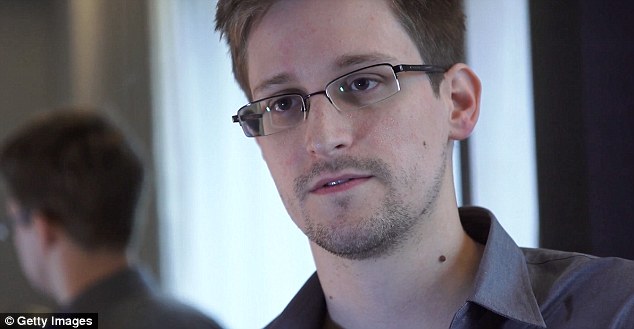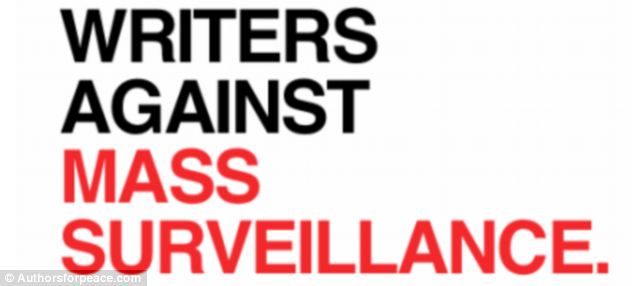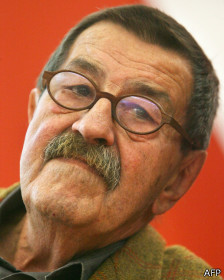Global group of prominent writers have joined forces to speak out about widespread surveillance including NSA scandal
NSA surveillance described as attack on ‘basic pillar of democracy… the inviolable integrity of the individual
Recent survey by the writers’ rights group PEN found 85percent of American writers are increasingly fearful of government surveillance
Comes hot on heels of eight of the world’s largest tech giants urging President Obama to rein in internet surveillance
The appeal – A Stand For Democracy In The Digital Age – is against all widespread ‘mass surveillance’ by governments and corporations and comes hot on the heels of eight of the world’s largest technology companies, including Facebook and Google, urging Barack Obama and other leaders to rein in internet surveillance.
The NSA surveillance is a systematic abuse of power, claim the writers, and an attack on ‘a basic pillar of democracy… the inviolable integrity of the individual’.
‘In their thoughts and in their personal environments and communications all humans have the right to remain unobserved and unmolested,’ the appeal argues.
‘This fundamental human right has been rendered null and void through abuse of technological developments by states and corporations for mass surveillance purposes.
‘Surveillance violates the private sphere and compromises freedom of thought and opinion. Mass surveillance treats every citizen as a potential suspect. It overturns one of our historical triumphs: the presumption of innocence.’
Among the ‘writers against mass surveillance’ from some 80 countries are the Nobel laureates Orhan Pamuk, JM Coetzee, Elfriede Jelinek, Günter Grass and Tomas Tranströmer.
Other notable signers include Richard Ford, Margaret Atwood, Umberto Eco, Yann Martel, Dave Eggers, Colum McCann, Sapphire, Ian McEwan, and Don DeLillo.
The appeal comes in the wake of recent revelations by whistleblower Edward Snowden exposing extensive and intrusive telephone and internet surveillance by the U.S. and its western allies.
-
The ‘writers against mass surveillance’ group consists of 560 writers, including five Nobel literature laureates, from 80 countries
It was organized by an independent international group of authors Juli Zeh, Ilija Trojanow, Eva Menasse, Janne Teller, Priya Basil, Isabel Cole, Josef Haslinger – though personal contacts and private networks.
The appeal calls for the drafting by the U.N. of an International Bill of Digital Rights and on governments to sign and adhere to such a convention.
‘We are really very worried about mass surveillance. We think it’s undermining democracy totally, and we are shocked that more people aren’t up in arms about it,’ said Danish writer Janne Teller.
Teller said she doesn’t believe writers are threatened more than ordinary citizens by mass surveillance, but their work makes them particularly attuned to its dangers.
‘I think it’s quite significant when you have 560 or so of the greatest contemporary writers, from all across the world, expressing a very serious concern, because these are people who always work on the big philosophical questions of life,’ Teller said. ‘Hopefully their concern matters to politicians.’
A recent survey by PEN found American writers are increasingly fearful of government surveillance in the wake of Edward Snowden’s revelations about the NSA and have even started to self-censor
A recent survey by the writers’ rights group PEN found American writers are increasingly fearful of government surveillance in the wake of Snowden’s revelations about the NSA and have even started to self-censor their work.
Eighty-five percent of PEN’s American members are worried about government surveillance, the group’s report found.
Twenty-eight percent of PEN’s members have curbed their social media use, 24 percent are avoiding certain topics in phone and email conversations, and 16 percent have avoided writing or speaking about issues, the survey found.
Writers reported being fearful about discussing military affairs, the Middle East North Africa region, mass incarceration, drug policies, pornography, the Occupy movement, the study of certain languages, and criticism of the U.S. government.
Teller, who lives in New York, said she hopes Americans will join the writers’ outrage over mass surveillance by adding their names to a public version of the appeal.

A recent survey by PEN found American writers are increasingly fearful of government surveillance in the wake of Edward Snowden’s revelations about the NSA and have even started to self-censor
The organizers are inviting others to sign the petition at www.change.org/surveillance.
A Stand For Democracy In The Digital Age: Full text of writer’s joint statement
In recent months, the extent of mass surveillance has become common knowledge.
With a few clicks of the mouse the state can access your mobile device, your e-mail, your social networking and internet searches.
It can follow your political leanings and activities and, in partnership with internet corporations, it collects and stores your data, and thus can predict your consumption and behavior.
The basic pillar of democracy is the inviolable integrity of the individual. Human integrity extends beyond the physical body. In their thoughts and in their personal environments and communications, all humans have the right to remain unobserved and unmolested.
This fundamental human right has been rendered null and void through abuse of technological developments by states and corporations for mass surveillance purposes.
A person under surveillance is no longer free; a society under surveillance is no longer a democracy. To maintain any validity, our democratic rights must apply in virtual as in real space.
- Surveillance violates the private sphere and compromises freedom of thought and opinion.
- Mass surveillance treats every citizen as a potential suspect. It overturns one of our historical triumphs, the presumption of innocence.
- Surveillance makes the individual transparent, while the state and the corporation operate in secret. As we have seen, this power is being systemically abused.
- Surveillance is theft. This data is not public property: it belongs to us. When it is used to predict our behavior, we are robbed of something else: the principle of free will crucial to democratic liberty.
WE DEMAND THE RIGHT for all people, as democratic citizens, to determine to what extent their personal data may be collected, stored and processed, and by whom; to obtain information on where their data is stored and how it is being used; to obtain the deletion of their data if it has been illegally collected and stored.
WE CALL ON ALL STATES AND CORPORATIONS to respect these rights.
WE CALL ON ALL CITIZENS to stand up and defend these rights.
WE CALL ON THE UNITED NATIONS to acknowledge the central importance of protecting civil rights in the digital age, and to create an International Bill of Digital Rights.
WE CALL ON GOVERNMENTS to sign and adhere to such a convention.



